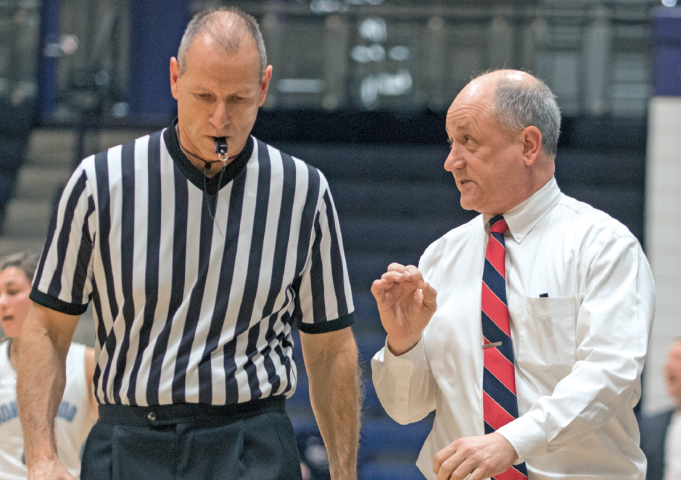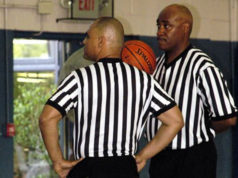The legendary Ed Hightower was “on loan” to the Western Athletic Conference many years ago handling the referee duties during a Fresno State game. About 30 seconds into the contest, Hightower had a foul call in front of the opposing coach. He raised his fist in the air, body slightly tilted forward from the momentum of running, and just as he blew the whistle, the coach started in. Hightower held his position, arm straight as an arrow, frozen in time.
“Not today, coach. Not today.”
“But …”
“Not today, coach! Not today.”
“How can you …”
“Not today, coach! Not today.”
The coach relented his argument, and only then did Hightower break his statue-like position and retire to the scorer’s table to report his foul. He got his message across, and likely would have held his ground another 30 seconds until the coach decided to take the higher road for the night.
We’ve all had this happen (or will). First minute or so of the game, and for some reason the coach is determined to get his point across loudly and often. Someone spiked coach’s Wheaties, or his shoes were too tight, or who knows what, but tonight this team leader is irritated and is going to let your crew know it, immediately. What to do? We can’t all be Ed Hightower. Heck, only Ed Hightower can pull off the school-principal-meets-traffic-cop bulldozer attitude to calm a coach for the next 40 or so minutes.
For the rest of us, there actually are a series of steps we can take as an individual and as a crew to corral the coach early so the night doesn’t become a Mike Tyson boxing match times 10.
When it comes to referee/coach communication, usually one uses a combination of practiced phrases and a dash of his or her own personality. After many years of experience, a veteran official can smooth out most issues with grace and professionalism. Younger officials are also given catch phrases, using terms like, “By rule, coach,” and “That’s enough,” with the palm facing the floor. Finally, there’s a mention of the tools provided in the rulebook: official warnings followed by technical fouls, and, if necessary, disqualification of the coach.
All of those methods earned throughout the ages are helpful during a contest, but there’s an entirely different program to follow for the early onset irritated coach. There’s really no way a crew wants to start a game with a technical for unsportsmanlike behavior, or even an official warning. The hefty and loaded tropes of, “I heard you, coach!” and “Enough, coach!” are just going to up the stakes and create havoc before the players can work up a sweat.
Time to put on your psychology hats, kids, and start by finding out the problem.
Generally, at least one member of the crew has an idea how the opposing coaches will tend to act during the course of play and will bring up the generics of bench control during the pregame. Ideally, none of the crew will be warning or penalizing any coaching behavior during the contest until the coach has acted completely out of character, above and beyond his or her consistent activities. If you know a coach is loud and animated throughout a game, you can deal with it when said coach steps out of that mold and/or personally attacks the crew.
But in that first minute, when a coach is instantly out of character, stop what you’re doing. It’s time to talk to that coach as a human being, using a quiet tone and empathy. Ask what’s going on. Use the old, “Hand me a towel so I can wipe off the ball” or “Let me tie my shoe here” to get close to the coach at the first opportunity. If you can, stand with your back to the coach and your mouth covered by your fist, so no one thinks you’re confronting or about to show up the coach.
Then ask a simple question: “Coach, is everything OK? What’s going on, Bill?”
I know, some referees don’t advocate using the coach’s first name. This one time, this early in the game, do it.
“This isn’t like you, Sue. Seriously, what’s going on? Can I help?” And mean it when you ask. You don’t have all day, of course, but you have to make a little time for this. If the coach blows you off or waves you off, ignore the action and move on. During the first timeout, try to sidle up to an assistant and ask similar questions, because something is causing this coach pain today.
More often than not, you’ll find out the answer from the sheepish coach. He or she was looking for a confrontation. You gave a heartfelt ear of concern instead. Nine times out of 10 it’s going to relate to a past game’s officials, or a tournament snub, or a short-handed roster. That other time there actually will be a personal conflict where the coach feels he or she was wronged by one of the crew members the last time and isn’t going to let it happen today.
For the first nine times, remind the coach quietly that this is a new day, you’re a new crew, and promise you’re going to work your tail off. “Sorry to hear about that last game, coach. I can’t imagine what that’s like, but I can tell you we talked earlier and we’re gonna give you 100 percent on this one. If you have any questions about a call, find one of us at the right time and just ask. We’re here for you.”
On that 10th time , you’ll have to be more direct. “Hey, I hear ya. But this is the crew you’ve got today, and if you give us a chance, I think you’ll see we’re gonna give our best effort out there. I understand if you’re going to be angry about a few calls, just keep it short and contained and we’ll work with you.”
Even if the coach grumbles a bit, it’s guaranteed you worked some magic, just by breaking that animosity between what the coach believes are warring factions. Let the coach know you’re human, and if it was you the coach is upset about, own it. “Hey, Stacy, that was a rough night for me, I had a lot going on. I’m with a great crew today, though, and I feel really good about this game. If you can forgive me that last game, I promise to bust my butt today for you. Are you good with that?”
Yes, this conversation could delay the game for a bit, but it has to happen, or the coach will give you no choice but to prove his or her suspicions correct, that you’re the kind of crew that’ll throw said coach under the bus and give a technical without hesitation. If it’s the first minute or two of the contest, hesitate.
Find out what’s wrong, then communicate with your crew as soon as you can about what you found out.
Then? It’s back to business as usual. You’ve got a game to call, rules to enforce and situations to control. If the coach doesn’t accept your goodwill, it’s time to return to warnings, stern reminders, and finally, technical fouls. From that first minute’s conversation onward, the onus is on the coach to act like the professional he or she is supposed to be, the example for the athletes, and the solid representative of that school or organization.
If it happens in that first few moments, remember — somebody hurt that coach. Find out what happened, and like any good human being, reassure that you’re there for all of the players and both coaches, you’ll work your heart out, and for as long as they’ll let you, you’ll work with them to resolve any confusion during the game.
If it happens after that? “Not today, coach! Not today!”
Stephen A. Mintz, Fresno, Calif., is an award-winning writer. He officiated basketball for 30 years and now is a collegiate evaluator and instructor.
What's Your Call? Leave a Comment:
Note: This article is archival in nature. Rules, interpretations, mechanics, philosophies and other information may or may not be correct for the current year.
This article is the copyright of ©Referee Enterprises, Inc., and may not be republished in whole or in part online, in print or in any capacity without expressed written permission from Referee. The article is made available for educational use by individuals.

















